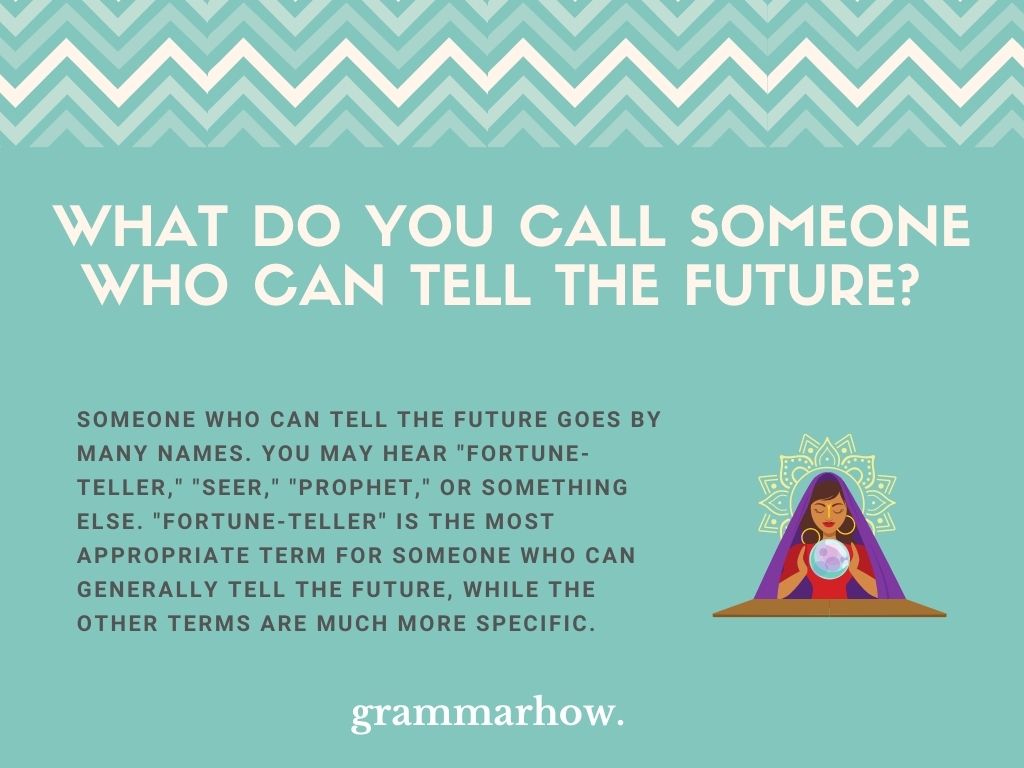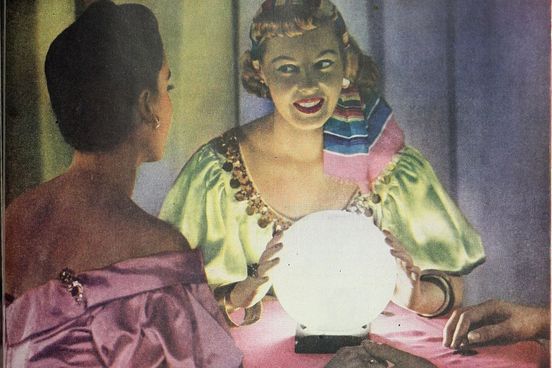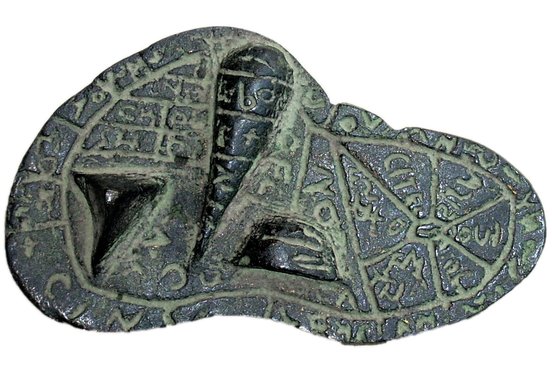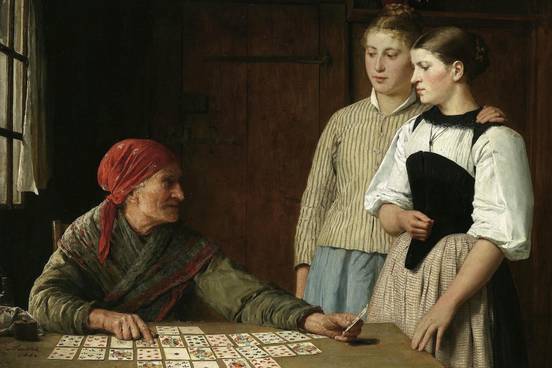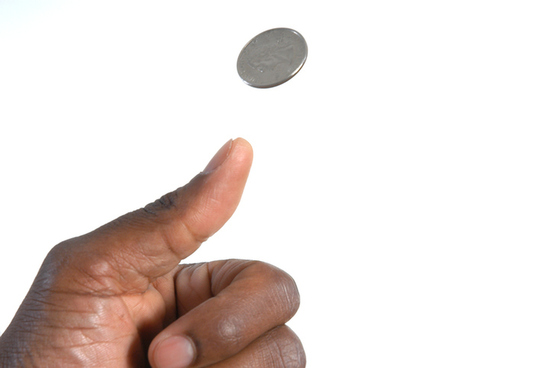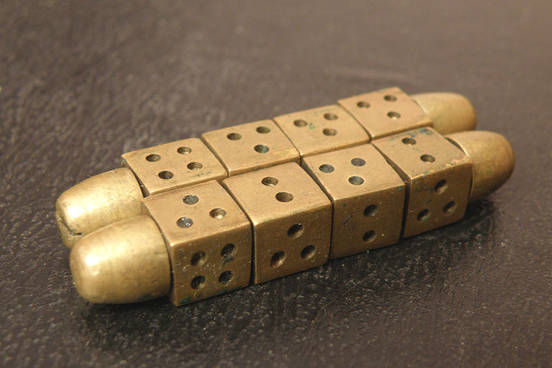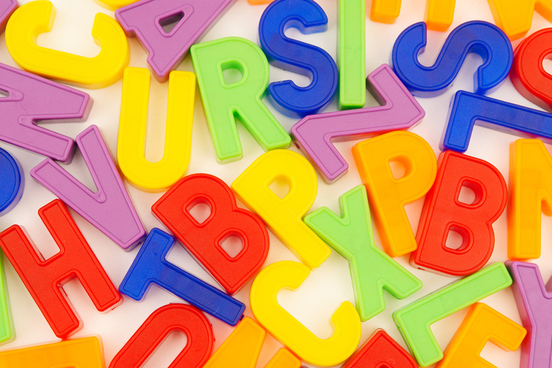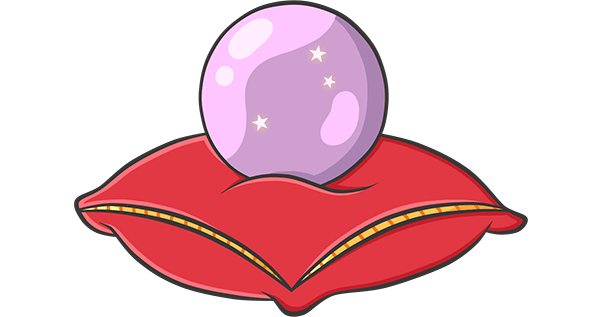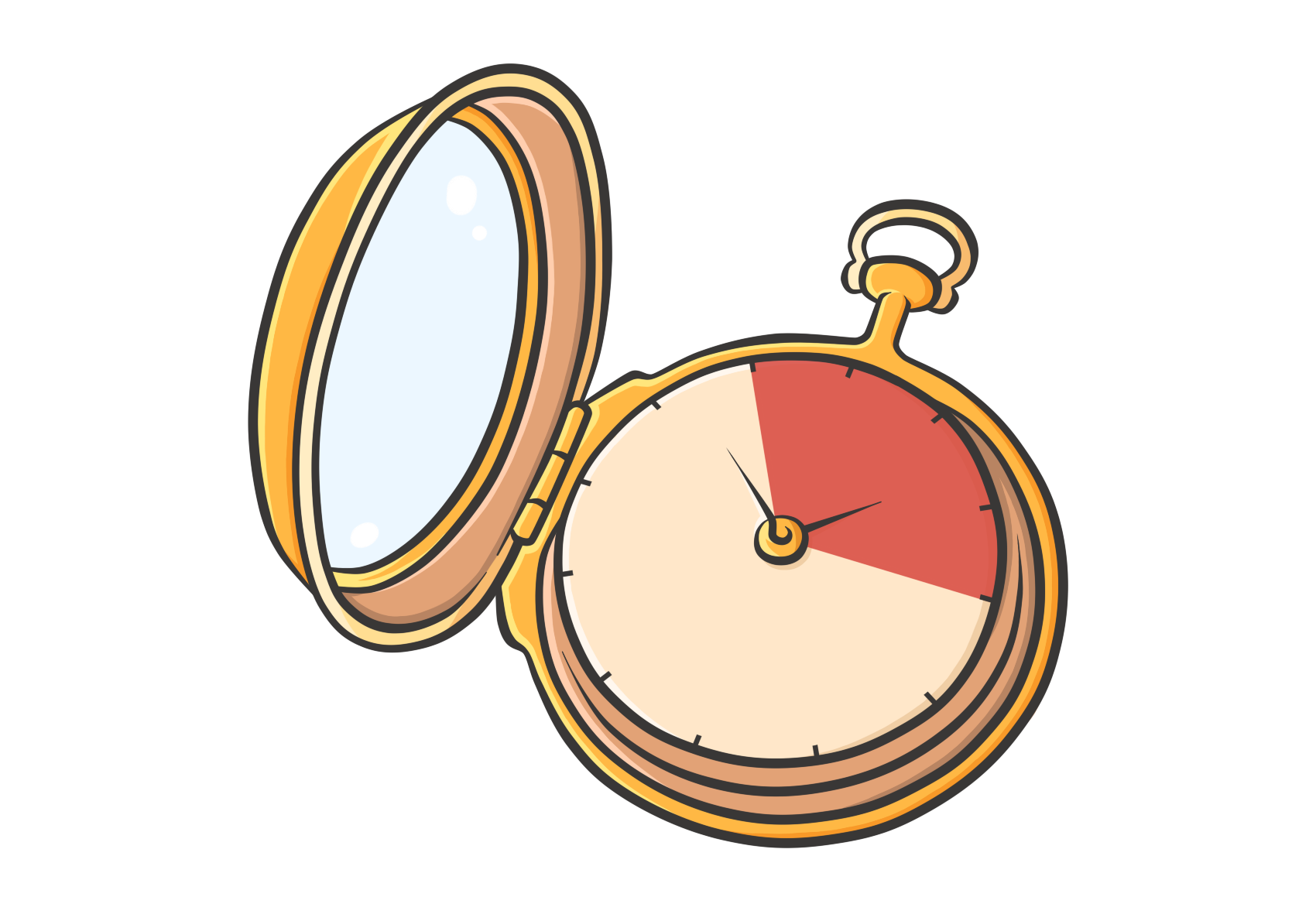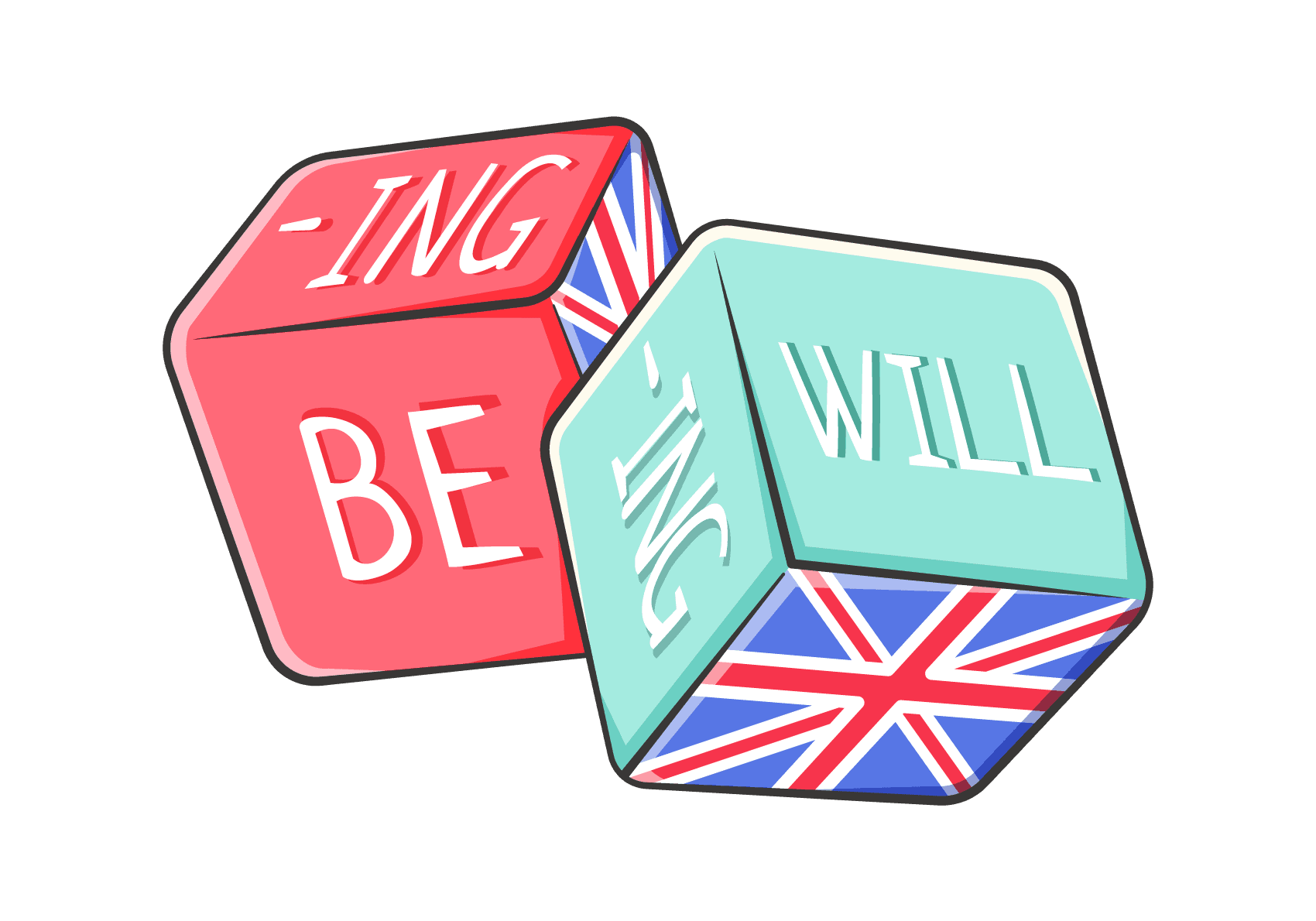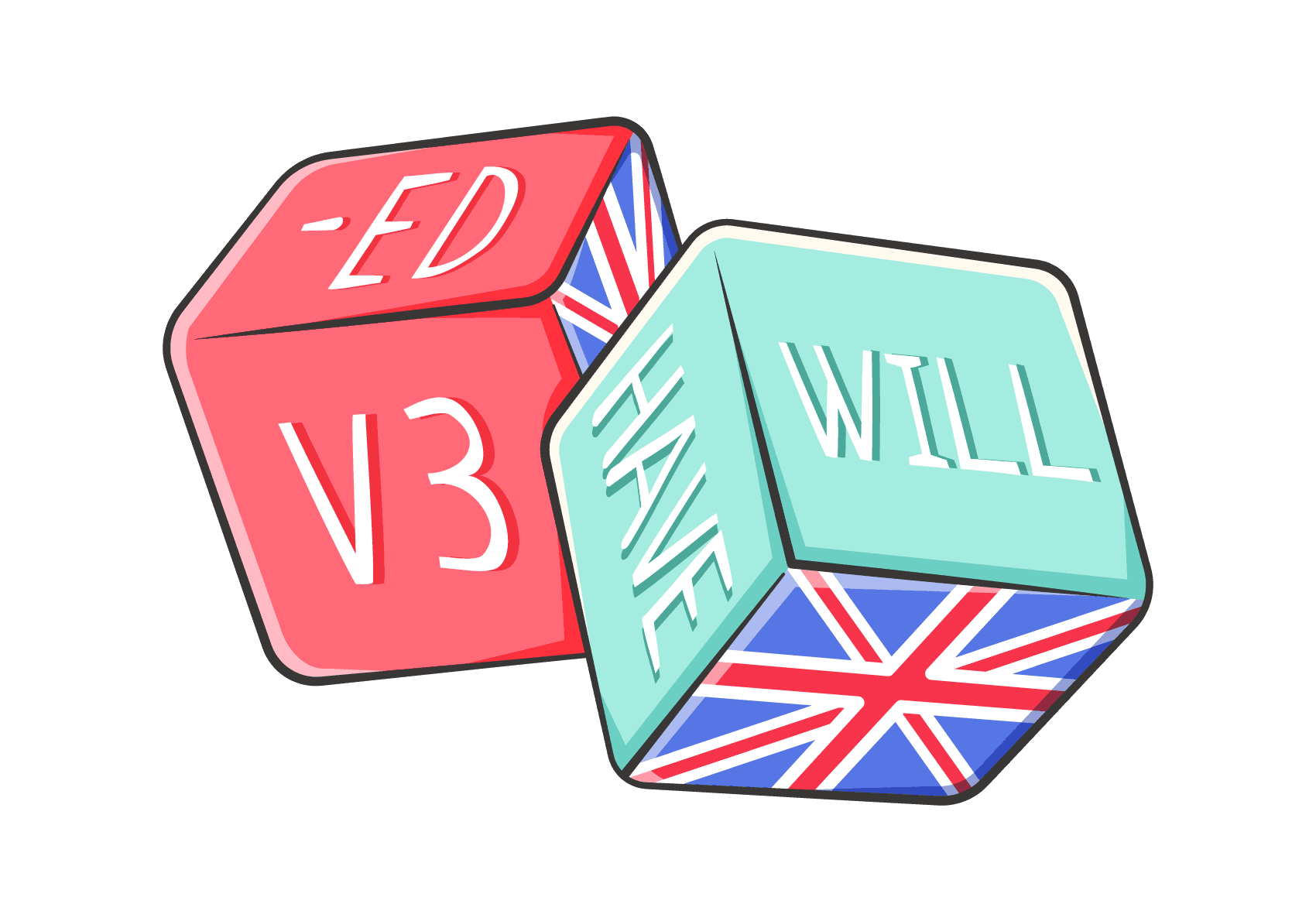Being able to tell the future is something that’s extensively debated. Whether you believe in the possibility of it or not is unimportant in this article. For now, we simply want to run you through the 15 best words for people that can tell the future and how you can use them.
What Do You Call Someone Who Can Tell The Future?
Someone who can tell the future goes by many names. You may hear “fortune-teller,” “seer,” “prophet,” or something else. “Fortune-teller” is the most appropriate term for someone who can generally tell the future, while the other terms are much more specific.
The term “psychic” is closely related, though this often refers to a spiritual connection to the departed (like talking to ghosts rather than seeing the future).
In this article, we’ll look at these 15 terms, as well as learning more closely what each one means and refers to:
- Fortune-Teller
- Seer
- Prophet
- Augur
- Cassandra
- Crystal Gazer
- Doomsayer
- Futurist
- Jeremiah
- Oracle
- Palm Reader
- Prophesier
- Prognosticator
- Sibyl
- Soothsayer
Fortune-Teller
We’ll start with the most popular choice on the list. “Fortune-teller” is the most common word you’ll hear given to a person that can tell the future.
A fortune-teller is someone who can foretell events. That means they’ll be able to share with a client some events that will affect them in the future.
Generally, a fortune-teller is the name of a job that people who when they are paid to tell the future. “Fortune” is closely related to things that happen in the future, though it most closely relates to good things since “fortune” also means “luck.”
Seer
The next word we want to go through is “seer.”
“Seer” is the term used when talking about somebody who can predict future events as if they can see them. Generally, modern experts are referred to as “seers” because “fortune-teller” is slowly falling out of favor.
To pronounce “seer,” remember to think of it as the word “see” first. We say “see-er,” not “sear,” which is a common confusion, even for native speakers.
Prophet
Next, we’ll talk about “prophets.” This is a great term to use, but it’s a little more specific in its application.
A prophet is someone who knows about future events based on some form of divine inspiration. This is an even more debatable thing in the modern world, but you might have read about prophets in religious texts before.
Generally, if a person is saying that they’re getting their knowledge and predictions from divine power, you can call them a “prophet” over any of the other terms on this list.
Augur
“Augur” is another more specific term that we can use to talk about someone who can see future events.
An “augur” is someone who uses omens to analyze and predict future events and patterns. It can also be used as a verb, like “this augurs well” (meaning “this bodes well” or “this will go well” in a sarcastic tone).
“Augur” stems from the Ancient Roman Empire. It was the term used to describe people who used omens to predict the future back then. It’s much less common now, but it still occurs in certain traditions and cultures.
Cassandra
This is one of the three names on this list that refers to a person in some historical context.
A “Cassandra” is a name for somebody who predicts the future. However, the predicted events are often unfortunate and are done in vain, much like the character Cassandra in Greek mythology, who was cursed to prophesize unfortunate happenings.
Again, this is a very specific term to call somebody. It’s much less common today, especially because of the deeper-rooted superstitions that surrounded the Ancient Greek traditions, which are no longer as prevalent today.
Crystal Gazer
“Crystal gazer” is a fairly well-known term today. It’s also one of the more commonly used terms to emphasize fortune-tellers in film and television (since it gives them a physical medium to demonstrate their abilities).
A crystal gazer uses a crystal ball or other related objects to predict the future. It’s commonly practiced today and is known as a modern sense of prediction without sufficient information. It can result in truths coming out but also might backfire and be incorrect.
Since information is important most of the time when doing any form of future telling, crystal gazing can sometimes be seen as ineffective. However, it’s also generally more acceptable when the foretold events do come true since there wasn’t a lot of information to work with.
Doomsayer
While not the most desirable form of a person who tells the future, a doomsayer is still an option to use.
A doomsayer is somebody who frequently predicts disastrous events. Usually, doomsayers are ignored, as they will often talk about the end of the world (which never happens when they tell you it will).
Of all the fortune-telling professions and terms, a doomsayer is definitely the most mocked of the bunch. Many people will simply pass a doomsayer on the street and consider them nothing more than a crazy person.
All of a doomsayer’s predictions are typically not found on any specific information or visions.
Futurist
The next term is “futurist,” which might sound like a simple one, but there’s a little more to explain about it.
A futurist is somebody who gives an opinion about the future based on past or current events. They usually have a lot of information to work with compared to other fortune-telling terms.
A futurist will almost never tell you that they can predict the future. They will simply say that they’re offering you a serious discussion about the impact of your past and current situations that might lead to something in the future.
They understand that there isn’t a guarantee any of their predictions will come true.
Jeremiah
Jeremiah is the second of the three names on this list which are also used as terms in this regard.
A “Jeremiah” is somebody who predicts disaster. It is from the Bible and refers to the pessimistic prophet with the same name. It’s similar to a doomsayer, though it’s much less common to use.
Oracle
You might have heard of the term oracle before, as it’s one of the more popular choices to use in media.
An “oracle” is historically somebody who acts as a mouthpiece for a deity. It originates from Ancient Greek stories and allows us to explain who certain people were blessed with foresight and predicting the future. Now, it refers to anyone who can predict the future.
“Oracle” is an umbrella term for anyone with the ability to predict the future. It’s commonly used in film and television, but the original meaning of the deities speaking through the people seems to be lost.
Palm Reader
A “palm reader” is another very popular choice for people to refer to because it gives an obviously readable medium for the fortune-teller to work with.
A palm reader can also be called a palmist. They predict the future based on the lines in a person’s palm. Everyone has different lines across their palms, and each line refers to a different future event for the person.
Many people believe in the power of palm readers and will allow them to read their palms to foretell what comes next for them. Typically, a palm reader will charge for their abilities.
Prophesier
A prophesier is somebody who reads prophecies and makes predictions based on them. Typically, these predictions are more poetic than a typical one, leaving a lot up for interpretation.
A prophecy is usually a message relating to events in the future. Generally, they are kept very loose and poetic to allow people to interpret them in any way they want. They’re an older profession than most, and not many prophesiers exist today.
However, most written prophesies are passed down through generations, and some families still believe in the ones that closely relate to themselves.
Prognosticator
The next term is “prognosticator,” which is perhaps one of the least popular choices on this list. It’s also the rarest version of fortune-telling to come across based on how it works.
A prognosticator is somebody who predicts the future based on phenomena. That means they’ll pay close attention to miraculous things that happen and try to interpret exactly why those things came about and what it means for the future.
A prognosticator usually deals with groups of people rather than an individual.
Sibyl
The final named term on the list is known as Sibyl.
A “Sibyl” was a female prophet in Ancient Greek. Much like some of the other Ancient Greek names on this list, it is still used today, though not very common to see.
It’s another general term that refers to any woman who is capable of reading the future. No matter what type of fortune-telling they practice, they are known as Sibyl if they can read it.
Soothsayer
Finally, we’ll look at “soothsayer.” These can almost be considered the opposites of “doomsayers.”
A soothsayer is somebody who predicts the future based purely on reason, intuition, and, in very rare circumstances, magic. While the magic portion of soothsayers seems to have fallen out of trend, reason, and intuition are still incredibly important to them.
Martin holds a Master’s degree in Finance and International Business. He has six years of experience in professional communication with clients, executives, and colleagues. Furthermore, he has teaching experience from Aarhus University. Martin has been featured as an expert in communication and teaching on Forbes and Shopify. Read more about Martin here.
Even as scientists explore Quantum Theory, ancient practices for divining the future continue to flourish.
Ronald and Nancy Reagan regularly consulted astrologers, and many newspaper readers check the astrology column before looking at anything else. Tarot readers and palm readers make a living at it.
Here are some words writers might want to use in describing some of these practices.
Divination is the practice of foreseeing the future or finding out hidden knowledge by some means or other.
Ancient Romans studied the flight of birds to determine whether or not the day was favorable for some action. This method of divination is called augury. The verb to augur means “to predict or indicate the future.” One could say, missing a step on the way out of the house, That does not augur well!
Romans had a specialized diviner called a haruspex who cut open animals and examined their entrails. This practice is called haruspicy.
Several words that end in -mancy refer to methods of divination.
Geomancy interprets markings on the ground, or the piles or patterns made by dirt when it is tossed. The geo comes from the word for “earth.”
Necromancy involves summoning up the dead, the way King Saul did when he called on the Witch of Endor. The necro comes from the Greek word for “dead.”
Sometimes necromancy is used to refer to any kind of black magic that involves the summoning of demons.
Oneiromancy is divination by dreams.
Bibliomancy is divining by opening a book at random and reading the first phrase that one’s eyes light upon. Although the Bible is often the book used for this form of divination, other books are used. The biblio comes from Greek and Latin words for “paper” or “scroll.” The Bible is literally “the Book.” Another word for this practice is sortes.
Some other familiar types of divination:
Palmistry is divination by reading the lines on the palm of the hand.
Phrenology is divination by feeling the bumps on a person’s head. This practice was really popular in Victorian times. Many novelists have their characters talk about it.
Astrology predicts a person’s future according to alignment of the stars and planets.
Dowsing is a method of finding the location of water or other underground substances with the use of a forked stick or wire.
Clairvoyance is divination by “second sight”.
Numerology is divination with numbers
Sortilege is divination by casting lots. Priests do it in the Old Testament.
Finally, two practices that you know about, but probably don’t know the words for, are those of reading tea leaves and gazing into a crystal ball.
Tasseography is the word for reading the future in tea leaves at the bottom of a cup.
Scrying is what the gypsy does when she looks into her crystal ball and tells you that you are going to come into a large sum of money.
If you ever doubted that English has a word for everything, take a look at these sites that feature lists of divination of every kind:
Online etymology dictionary
Stop making those embarrassing mistakes! Subscribe to Daily Writing Tips today!
You will improve your English in only 5 minutes per day, guaranteed!
Subscribers get access to our archives with 800+ interactive exercises!
You’ll also get three bonus ebooks completely free!
Divining the Future
It seems humans have for a very long time been troubled by the opacity of the future. They’d like to have a better sense of what lies ahead, and they’ve come up with some ingenious ways of trying to get at that information, each of which has a name.
The selection that follows includes words that end in a common suffix: -mancy, meaning «divination.» Divination is the art or practice that seeks to foresee or foretell future events, or to discover hidden knowledge. Divination usually involves the interpretation of omens or, if you’re really lucky, the assistance of supernatural powers. Let us know if any of these work for you.
Definition : divination from the state of the air or from atmospheric substances
Aeromancy requires that you keep your eyes on the skies. You’ll have to watch for clouds, birds, precipitation, etc. This word doubles as a fancy word for weather forecasting, though we have yet to hear the word thrown around on the local weather report.
Definition : divination by means of flour
You dabble in a little aleuromancy every time you crack open the fortune cookie that arrives with your lo mein. In earlier practices, messages were baked into little balls of dough.
Aleuro- means «flour,» naturally, but it’s only used in technical words like aleuronat, which refers to a flour with a high gluten content.
Bronze model of a sheep’s liver covered with Etruscan inscriptions and subdivided into sections for use in fortune-telling. Late 2nd century B.C.E.
Definition : divination from the entrails of a human being
Don’t try this one at home—or anywhere else. Horrifyingly, anthropomancy is widely reported to have been practiced by a great many of the ancient peoples of the world. Anthropo comes, via Latin, from the Greek anthrōpos, meaning «human being.»
Definition : divination by means of small bones or dice
In early astragalomancy small bones with marks carved into them were thrown and their positions used to predict the future. The Latin word astragalus comes from the Greek astragalos, meaning both «neck vertebra» and «molding.» The word astragal can in modern English refer to a narrow half-round molding or to a projecting strip on the edge of a folding door.
Definition : divination by means of the movements of an ax placed on a post
An ax will only balance on a post for so long. When it moves, according to axinomancy, its motions offer insight into who is guilty and who is not. At the word’s root is the Greek axinē, meaning «axhead» or «ax.»
Definition : divination by drawing arrows at random from a container
The arrows most often used in belomancy have messages written on them. The belo- part of this word comes from the Greek bélos, meaning «missile, dart, arrow.» Bélos itself comes from ballein, meaning «to throw»—a root of such varied words as problem, hyperbole, parable, and devil.
Definition : divination by books, especially the Bible
You can open any book to a random page and decide that the first thing your eyes land on is a message that pertains to your future: instant bibliomancy. Bibliomancy is especially practiced with sacred books, such as the Bible, but we like to use a dictionary.
Definition : fortune-telling by means of playing cards
Bring new meaning to your bridge game. In the 18th century, young women would apparently use cartomancy to learn the details of their own nuptials—including whom their future husband would be. The cart in cartomancy of course means «card,» and as the modern phrase tells us, if it’s in the cards, it’s inevitable.
Definition : divination by a mirror or by crystal gazing
Catoptromancy is a broad term of divination. If you want to be specific, use enoptromancy for the mirror divination, like that employed by the wicked queen in the story of Snow White, and crystallomancy for the ball of rock crystal that the Wicked Witch of the West uses in The Wizard of Oz. (Employing crystallomancy is also referred to as «scrying.»)
The likely root of the first part of catoptromancy is Greek katoptron, meaning «mirror.»
Definition : divination from figures formed by melted wax in water
Melted wax takes on interesting forms, and when you pour the melted wax into water the forms solidify and you can tell the future. According to ceromancy, that is.
Definition : divination by examination of the hand
This word is also spelled cheiromancy. And it’s a synonym of the more common word palmistry. Chiromancy has fallen in and out of favor over the millennia of its history. In Medieval times, those hunting witches using chiromancy looked for pigmentation spots on the hands, which signaled a pact with the Devil.
Definition : divination by means of casting lots
What does it mean to «cast lots»? Cast here means «throw» or «toss.» Lots are objects—such as marked sticks or dice—used as a counter when determining a question of chance. In cleromancy, the lots are thrown and where and how they land provide clues about the future. If you use dice, you can refer to your particular kind of cleromancy as cubomancy.
Definition : divination by means of finger rings
In one form of dactyliomancy, a ring is suspended by a fine thread over a round table marked with the letters of the alphabet. In its dangling state, the ring settles briefly over particular letters, spelling out a message. Dactyl- means «finger,» «toe,» or «digit.»
A geomancy tool.
Definition : divination by means of figures or lines or geographic features
Take a piece of paper and a pencil and make a whole bunch of dots on it. If you believe in geomancy (and if you’ve done the dot-and-pencil work right) you may find that answers to your questions and predictions about the future lie somewhere in the configuration of those dots. To try an older version of geomancy, throw some dirt down and find information about the future in where the particles land. The term also refers to divination by geographical features.
Definition : divination in which one walking in or around a circle falls from dizziness and prognosticates from the place of the fall
The gyro- in this word is the same gyro- in gyroscope. It means «ring, spiral, circle.» Gyromancy does not typically involve the sandwich.
Definition : divination by water or other liquid (as by visions seen therein or the ebb and flow of tides)
Hydromancy can be similar to catoptromancy—when it is a reflection that interests the reader—or it can have to do with the movement of water, either the water’s own movement, or the way the water moves objects floating on it.
Definition : divination by inspection of water in a basin
The water inspected in lecanomancy may have stones tossed into it, or oil mixed into it. The word comes from the Greek lekanē, meaning «basin.»
Definition : divination by stones or by charms or talismans of stone
Lith- means «stone.» In lithomancy the stones are typically specially chosen stones, and are sometimes semiprecious. Qualities of the stones are important in lithomancy, such as how reflective of light they are.
Photo: Victoria & Albert Museum, London
Definition : conjuration (see conjure 2a) of the spirits of the dead for purposes of magically revealing the future or influencing the course of events
Phrased less delicately than our definition, necromancy is divination by the dead. The word is also used to broadly refer to magic or sorcery. Necro- means «one that is dead» or «those that are dead.»
Necromancy should not be confused with sciomancy, which is divination by consulting the disembodied spirits of the dead.
Definition : divination by means of dreams
Dreams can seem like messages from some other realm, and oneiromancy asserts that they indeed are that. The Bible’s book of Genesis tells of Joseph’s oneiromancy skills; he explains that Pharaoh’s dreams of fat and lean cattle, and full and thin heads of grain, predict of years of plenty to be followed by years of famine.
Definition : divination from the letters of a name
Letters are often assigned numerical values in onomancy. The word comes from onoma-, meaning «name.» The same root is at work in the words anonymous and eponymous.
Definition : divination by means of eggs
Consider trying oomancy the next time you poach an egg. The shape of the egg white as it cooks is believed to offer clues about the future.
Definition : divination by observation of the flight of birds
Also called augury, ornithomancy requires that attention be paid to birds and what they do. The word is, as one might supposed, related to ornithology, the zoological branch dealing with birds.
Definition : divination by means of leaves
The phyllo in phyllomancy means «leaf.» Methods of phyllomancy vary widely. It can have to do with the sound of leaves, the way leaves fall in autumn, or even with the way leaves or a leaf react to being placed in water.
Definition : divination by pebbles
Although pebbles are pretty much small stones, psephomancy is not to be confused with lithomancy, divination by stones or by special objects made from stones. In psephomancy, pebbles are often marked and drawn from a pile or container of pebbles.
Definition : divination by means of fire or flames
The pyro- part of this word of course means «fire,» and is found too in the word pyromania, «an irresistible impulse to start fires.»
Definition : divination by rods or wands
Rhabdomancy addresses both efforts to uncover information about the future as well as what is now more commonly called «dowsing»—that is, using a divining rod to find water. (A divining rod is a forked rod believed to show the person who uses it where water or minerals can be found underground by dipping downward when held over an underground supply.)
Definition : divination by means of an animal’s shoulder blade
Spatulamancy involves examining the shoulder blade of an animal that has been cooked over a fire. Although we think of the word spatula as referring to a kitchen implement, the Late Latin word it comes from means both «shoulder blade» and «spoon.» Scapulimancy is a synonym of spatulamancy. (Scapul- also means «shoulder blade.»)
Definition : divination by the responses of oracles supposed to be divinely inspired
The theo- in theomancy is the same theo- in theology and theocentric: it means «god.» The idea in theomancy is that an oracle may report to you what a deity has said, but there’s still the interpreting to do.
Definition : divination by means of pieces of wood
The pieces of wood used in xylomancy vary widely. They may be twigs, branches, or logs, and they may have fallen or be arranged. The xylo- means «wood,» and is also a root of the word xylophone.
В этой статье мы разберем формы будущего времени и узнаем, в каких случаях лучше употреблять то или иное время и конструкцию.
Содержание:
- 1. Время Future Simple
- 2. Конструкция to be going to do smth
- 3. Разница между Future Simple и to be going to do smth
- 4. Время Present Simple
- 5. Время Present Continuous
- 6. Разница между Present Simple и Present Continuous
- 7. Время Future Continuous
- 8. Время Future Perfect Simple
- 9. Время Future Perfect Continuous
- 10. Разница между Future Perfect Simple и Future Perfect Continuous
- 11. Другие способы выражения будущего времени в английском языке
В английском языке существует несколько способов говорить о будущем. В статье вас ждет информация о разных формах выражения будущего времени, актуальные примеры, а также сравнение всех способов.
Начнем с двух наиболее популярных способов выразить будущее время в английском языке — Future Simple и конструкции to be going to do smth.
Время Future Simple
Future Simple Tense (простое будущее время в английском языке) — это время указывает на действие, которое, вероятно, произойдет в ближайшем или неопределенном будущем.
Образование Future Simple
Давайте посмотрим, как образуется будущее время в английском языке.
Утвердительное предложение в Future Simple
Подлежащее + вспомогательный глагол will + смысловой глагол без частицы to
I will (I’ll) read this novel soon. — Я скоро прочту этот роман.
Perhaps, we will (we’ll) go on a trip to Italy. — Возможно, мы поедем в Италию.
Отрицательное предложение в Future Simple
Подлежащее + вспомогательный глагол will + частица not + смысловой глагол без частицы to
I will not (won’t) play this game. — Я не буду играть в эту игру.
She will not (won’t) pass the exam. — Она не сдаст экзамен.
Вопросительное предложение в Future Simple
Вспомогательный глагол will + подлежащее + смысловой глагол без частицы to
Will they help us choose the furniture? — Они помогут нам выбрать мебель?
Will he make a birthday wish? — Он загадает желание на день рождения?
Также в вопросах может встречаться глагол shall. Он используется, чтобы предложить помощь или что-то сделать вместе. Shall употребляется только с местоимениями I и we.
Shall we proceed? — Давайте продолжим?
Shall I help you with your bags? — Помочь тебе нести сумки?
Shall we eat out tonight? — Поужинаем где-нибудь сегодня вечером?
Употребление Future Simple
Давайте узнаем, когда используется Future Simple.
- Спонтанные решения, принятые в момент речи
Время Future Simple служит для того, чтобы объявить о своем решении в момент его принятия.
— The phone’s ringing.
— Oh, I’ll pick it up.
— Звонит телефон.
— О, я отвечу.— We’ve run out of sugar.
— No problem. I’ll buy some this afternoon.
— У нас закончился сахар.
— Не проблема. Я куплю его сегодня днем.— We need to leave now.
— No, I won’t go anywhere.
— Нам нужно уходить сейчас же.
— Нет, я никуда не пойду. - Обещания
Future Simple используется, когда мы что-то обещаем. Часто в таких предложениях употребляется глагол to promise (обещать).
I promise I will take care of your cat. — Я обещаю, что позабочусь о твоем коте.
I will always love you. — Я всегда буду любить тебя. - Предложения
Future Simple используется для выражения предложения что-то сделать. Напомним, что в данной функции в вопросительных предложениях может встречаться глагол shall.
Do you feel bad? I’ll bring you some medicine. — Ты плохо себя чувствуешь? Я принесу тебе лекарства.
Shall we take a coffee break? — Прервемся на кофе? - Угрозы
Future Simple используется для выражения угрозы.
You will regret your decision. — Ты пожалеешь о своем решении.
Stop there or I will shoot. — Стойте на месте, или я буду стрелять. - Предсказания, основанные на мнении говорящего
Future Simple используется для предсказаний, которые основываются исключительно на опыте и мнении говорящего. Когда мы используем will, говоря о будущем, у нас нет фактов, подтверждающих то, что действие произойдет.
В этой функции часто используются такие маркеры Future Simple, как I think (я думаю), I reckon (я думаю), I guess (я догадываюсь), I believe (я верю/считаю), I suppose (я предполагаю), I assume (я предполагаю), I’m sure (я уверен), I hope (я надеюсь), I’m afraid (я боюсь) и другие, а также слова perhaps/maybe (возможно), probably (вероятно), certainly (конечно).
I reckon he will make a good father. — Я думаю, он будет хорошим отцом.
I will not succeed in this business. — Я не преуспею в этом деле. - Будущие события, которые нельзя изменить
Future Simple используется в ситуациях, когда действие, о котором идет речь, точно произойдет, и мы ничего не можем изменить. То есть в этих ситуациях от нас ничего не зависит.
He’ll turn 60 in May. — В мае ему исполнится 60.
Хотите попрактиковаться в выборе верной формы выражения будущего времени? Записывайтесь на курс практической грамматики.
Конструкция to be going to do smth
Конструкция to be going to do smth в английском языке используется, чтобы сообщить о своих планах или намерениях что-то сделать в будущем. В разговорной речи очень популярна сокращенная форма оборота to be going to do smth — to be gonna do smth.
Формы конструкции to be going to do smth
Давайте посмотрим на использование конструкции to be going to do smth в утвердительных, отрицательных и вопросительных предложениях.
Утвердительное предложение с конструкцией to be going to
Подлежащее + вспомогательный глагол am/is/are + going to + основная форма глагола без частицы to
I’m going to take an IELTS exam. — Я собираюсь сдавать IELTS.
We are going to throw a party. — Мы собираемся устроить вечеринку.
He is going to ask her on a date. — Он собирается пригласить ее на свидание.
Отрицательное предложение с конструкцией to be going to
Подлежащее + вспомогательный глагол am/is/are + частица not + going to + основная форма глагола без частицы to
I am not going to tell her about my plans. — Я не собираюсь рассказывать ей о своих планах.
They are not going to invite any of my friends. — Они не собираются приглашать никого из моих друзей.
She isn’t going to go abroad. — Она не собирается уезжать за границу.
Вопросительное предложение с конструкцией to be going to
Вспомогательный глагол am/is/are + подлежащее + going to + основная форма глагола без частицы to
Are you going to have lunch with me? — Ты собираешься пообедать со мной?
Is she going to get married? — Она собирается выйти замуж?
Are they going to ask him for help? — Они собираются попросить у него помощи?
Функции to be going to do smth
- Планы и намерения
Употребление конструкции to be going to do smth выражает наши намерения или планы.
He’s studying medicine. He’s going to become a doctor. — Он изучает медицину. Он собирается стать врачом.
She’s not going to enter the university. — Она не собирается поступать в университет. - Предсказания будущего, основанные на очевидных фактах
Мы используем оборот to be going to do smth, чтобы указать на событие, которое вот-вот произойдет или уже начинает происходить. В данном случае говорящий обычно видит какое-то доказательство этому, поэтому сказанное им не является его личным мнением.
Wow! Look at the trees! They’re going to blossom. — Ух ты! Посмотри на деревья! Они скоро зацветут.
The sun’s shining brightly. So, it’s going to be a beautiful day. — Солнце светит ярко. День будет чудесным.
Разговорная форма конструкции to be going to do smth — to be gonna do smth
В фильмах, сериалах и неформальной переписке вместо конструкции to be going to do smth употребляется ее разговорный эквивалент to be gonna do smth. Основной глагол после gonna используется без частицы to (I’m gonna do it). Вопросительные и отрицательные предложения строятся так же, как и с to be going to do smth.
I’m going to lay the table. = I’m gonna lay the table. — Я собираюсь накрыть на стол.
She’s not going to record the album. = She’s not gonna record the album. — Она не собирается записывать альбом.
Is he going to help me? = Is he gonna help me? — Он собирается мне помогать?
Разница между Future Simple и to be going to do smth
Давайте посмотрим, чем отличаются время Future Simple и конструкция to be going to do smth.
| Future Simple | To be going to do smth |
|---|---|
| Спонтанное решение
— Oh, there isn’t any milk. |
Запланированное решение
I’m going to buy her a birthday present. — Я собираюсь купить ей подарок на день рождения. |
| Предсказание, основанное на мнении говорящего
I guess, he’ll pass the test. — Я думаю, он сдаст тест. |
Предсказание, основанное на очевидных фактах
Oh, now. That girl is going to fall off her bike now. — О, нет. Вон та девочка сейчас упадет с велосипеда. |
Время Present Simple
Present Simple — простое настоящее время, которое также используют для выражения будущего. Перед тем как перейти к случаям его использования, давайте вспомним схему его образования.
Образование Present Simple
Утвердительное предложение в Present Simple
I/You/We/They + смысловой глагол
He/She/It + смысловой глагол с окончанием -s
Please, hurry up! The train leaves in 5 minutes! — Пожалуйста, поторопись! Поезд уезжает через 5 минут.
The restaurant closes at midnight. — Ресторан закрывается в полночь.
Отрицательное предложение в Present Simple
I/You/We/They + вспомогательный глагол do + частица not + смысловой глагол
He/She/It + вспомогательный глагол does + частица not + смысловой глагол
The bus doesn’t stop in Venice. We go directly to Rome. — Автобус не останавливается в Венеции. Мы едем прямо в Рим.
She doesn’t celebrate her birthday tomorrow. — Она завтра не празднует свой день рождения
Вопросительное предложение в Present Simple
Вспомогательный глагол do + I/you/we/they + смысловой глагол
Вспомогательный глагол does + he/she/it + смысловой глагол
Does the concert start at 9 p.m.? We are so late! — Концерт начинается в 9 вечера? Мы очень опаздываем!
What time do you finish work tomorrow? — Во сколько ты заканчиваешь завтра работать?
Употребление Present Simple в будущем
- Present Simple используется для выражения будущего, когда говорим о расписании (транспорта, кино).
The final episode of The Big Bang Theory is on Wednesday. — Финальная серия «Теории Большого взрыва» будет в среду.
I’ve just checked the bus timetable in my app. The last bus leaves at 11 p.m. — Я только что проверила расписание автобусов в приложении. Последний автобус отправится в 11 часов вечера. - Present Simple можно употреблять, когда речь идет о событиях и планах, если они зафиксированы и мы не можем их изменить.
What time does our meeting start? — В котором часу начнется наше собрание?
I have a doctor appointment on Monday. — У меня прием у врача в понедельник. - Используйте Present Simple после слов after (после), before (до), as soon as (как только), when (когда), once (когда, как только) и until (до тех пор, пока).
As soon as she arrives, please, ask her to come in. — Как только она приедет, пожалуйста, попроси ее зайти.
Have your lunch before you leave. — Пообедай, перед тем как уйдешь.
Время Present Continuous
С помощью времени Present Continuous также можно выразить планы и намерения. Давайте посмотрим, как образуется время Present Continuous.
Образование Present Continuous
Утвердительное предложение в Present Continuous
Подлежащее + вспомогательный глагол am/is/are + смысловой глагол с окончанием -ing
He is running his first ultramarathon tomorrow. — Он бежит свой первый ультрамарафон завтра.
We are celebrating Katy’s 21st birthday next weekend. — Мы празднуем 21-й день рождения Кэйти на следующих выходных.
Отрицательное предложение в Present Continuous
Подлежащее + вспомогательный глагол am/is/are + частица not + смысловой глагол с окончанием -ing
I am not working tomorrow. It’s my first day off this month! — Я завтра не работаю. Это мой первый выходной в этом месяце!
Their trip got cancelled, so I am not taking them to the station. — Их поездка отменилась, поэтому я не отвожу их завтра на вокзал.
Вопросительное предложение в Present Continuous
Вспомогательный глагол am/is/are + подлежащее + смысловой глагол с окончанием -ing
What time are you leaving? — Во сколько ты уходишь?
Are you working late again next week? — Ты опять работаешь допоздна на следующей неделе?
Употребление Present Continuous в будущем
- Время Present Continuous используется для обозначения запланированного действия, которое произойдет в ближайшем будущем. В таких предложениях, как правило, присутствуют слова today (сегодня), tonight (сегодня вечером), tomorrow (завтра), next week (на следующей неделе), in May (в мае) и т. д.
We are meeting for dinner on Saturday night. You can come if you want. — Мы встречаемся на ужин в субботу вечером. Можешь прийти, если хочешь.
Ted has come back from his business trip so I am not babysitting his son tomorrow. — Тед вернулся из командировки, поэтому я завтра не нянчусь с его сыном. - Время Present Continuous употребляется, когда говорим о действии, которое собираемся совершить сразу же после того, как упомянули о нем. В таких предложениях используем глаголы движения: go (идти), come (приходить), arrive ( приезжать), leave (уходить) и др.
I need to get dressed. Give me a moment and I am coming. — Мне нужно одеться. Дай мне минутку, и я иду.
Sorry, I can’t wait anymore. I’m leaving. — Извини, я не могу больше ждать. Я ухожу.
Разница между Present Simple и Present Continuous
Давайте посмотрим, чем отличаются времена Present Simple и Present Continuous, когда речь идет о будущем.
| Present Simple | Present Continuous |
|---|---|
| Расписание, программа
— What time does the ferry arrive at the harbor? |
Запланированное действие
— What time are you arriving tomorrow? |
Время Future Continuous
Образование Future Continuous
Утвердительное предложение в Future Continuous
Подлежащее + вспомогательные глаголы will be + смысловой глагол с окончанием -ing
I will be driving all day tomorrow to get there in time. — Я буду ехать весь день завтра, чтобы прибыть туда вовремя.
They will be living in a new house when you come back from New Zealand. — Они будут жить в новом доме, когда ты вернешься из Новой Зеландии.
Отрицательное предложение в Future Continuous
Подлежащее + вспомогательные глаголы will be + частица not + смысловой глагол с окончанием -ing
She will not be working on Monday. — Она не будет работать в понедельник.
You can call me, I will not be sleeping. — Можешь мне позвонить, я не буду спать.
Вопросительное предложение в Future Continuous
Вспомогательный глагол will + подлежащее + вспомогательный глагол be + смысловой глагол с окончанием -ing
What will you be doing when I leave? — Что ты будешь делать, когда я уйду?
Will they be watching series all evening again? — Они опять будут смотреть сериал весь вечер?
Употребление Future Continuous
Теперь давайте разберем, в каких случаях это время необходимо.
- Используем Future Continuous, когда говорим о продолжительном действии, которое будет происходить в будущем в какой-то период времени. Это время может быть указано или понятно из контекста.
I will be meditating, so don’t disturb me, please. — Я буду медитировать, поэтому не беспокой меня, пожалуйста.
Sir, you will be giving your speech at the end of the ceremony. Please, be ready. — Сэр, вы будете произносить речь в конце церемонии. Пожалуйста, будьте готовы. - Future Continuous употребляется в вежливых вопросах.
Could you tell me if we will be visiting Saint Paul’s Cathedral today? — Не могли бы вы сказать, будем ли мы посещать Собор Святого Павла сегодня?
Excuse me, what time will you be giving the interview? — Извините, в котором часу вы будете давать интервью?
Время Future Perfect Simple
Образование Future Perfect Simple
Утвердительное предложение в Future Perfect Simple
Подлежащее + вспомогательные глаголы will have + смысловой глагол в 3-й форме
I will have cleaned my room by the time mum gets home. — Я уберу комнату до того, как мама вернется домой.
They will have received the invitation by the end of the week. — Они получат приглашение до конца недели.
Отрицательное предложение в Future Perfect Simple
Подлежащее + вспомогательный глагол will + частица not + вспомогательный глагол have + смысловой глагол в 3-й форме
I will not have finished reading this book by evening. Give me more time! — Я не закончу читать эту книгу до вечера. Дай мне больше времени!
Susan will not have found a new job by that time. — Сьюзан не найдет работу к тому времени.
Вопросительное предложение в Future Perfect Simple
Вспомогательный глагол will + подлежащее + вспомогательный глагол have + смысловой глагол в 3-й форме
Will you have introduced us to your fiance before your wedding? — Ты познакомишь нас со своим женихом до свадьбы?
Will we have finished our course by the end of the year? — Мы закончим наш курс до конца года?
Употребление Future Perfect Simple
Используем Future Perfect Simple для действий, которые будут завершены до определенного момента в будущем. Наиболее популярное слово-маркер этого времени — by (к какому-то моменту).
I will have got my driver’s license by June. — Я получу свое водительское удостоверение к июню.
They will have left by the time we arrive. — Они уйдут к тому времени, как мы приедем.
Mother will have finished cooking by the time you come from school. — Мама закончит готовить к тому времени, как ты придешь со школы.
Время Future Perfect Continuous
Образование Future Perfect Continuous
Утвердительное предложение в Future Perfect Continuous
Подлежащее + вспомогательные глаголы will have been + смысловой глагол с окончанием -ing
By the evening it will have been snowing for 18 hours. — К вечеру снег будет идти уже 18 часов.
By the end of the year I will have been working here for two years. — К концу года я проработаю здесь два года.
Отрицательное предложение в Future Perfect Continuous
Подлежащее + вспомогательный глагол will + частица not + вспомогательные глаголы have been + смысловой глагол с окончанием -ing
She will not have been working long enough by April to participate in a conference. — До апреля она не проработает достаточно, чтобы участвовать в конференции.
We will not have been talking for a month by next Friday. — К следующей пятнице мы не будем разговаривать уже месяц.
Вопросительное предложение в Future Perfect Continuous
Вспомогательный глагол will + подлежащее + вспомогательные глаголы have been + смысловой глагол с окончанием -ing
Will you have been studying German for three years next month? — В следующем месяце ты будешь изучать немецкий уже три года?
Will they have been living here for 20 years by 2025? — Они проживут здесь 20 лет к 2025 году?
Употребление Future Perfect Continuous
- Используем Future Perfect Continuous, когда говорим о действии, которое будет продолжаться до определенного момента в будущем или другого действия.
I will have been teaching her Spanish for a year by the time she visits Spain. — Я буду обучать ее испанскому год к тому времени, как она поедет в Испанию.
How long will you have been waiting for her when she finally arrives in the evening? — Как долго ты будешь ее ждать, когда она наконец-то придет вечером? - Используем Future Perfect Continuous, когда необходимо указать причину какого-либо действия в будущем. В таких предложениях присутствует союз so (поэтому) или because (потому что).
She will feel much better after she visits the psychologist because they will have been discussing all her worries and problems. — Она будет чувствовать себя намного лучше после того, как посетит психолога, потому что они будут обсуждать все ее переживания и проблемы.
They will have been working in the garden since early morning, so they will be exhausted. — Они будут работать в саду с раннего утра, поэтому будут очень уставшими.
She will have been singing for an hour so she will need a few bottles of warm water. — Она будет петь в течении часа, поэтому ей понадобятся несколько бутылок теплой воды.
Разница между Future Perfect Simple и Future Perfect Continuous
Давайте посмотрим, чем отличаются времена Future Perfect Simple и Future Perfect Continuous.
| Future Perfect Simple | Future Perfect Continuous |
|---|---|
| Акцент делается на результате действия и его завершенности
By 3 o’clock he will have finished working on his graduation speech. — К 3-м часам он закончит работать над его речью на выпускной. |
Акцент делается на продолжительности действия
By 3 o’clock he will have been working on his graduation speech for five hours. — К 3-м часам он будет работать над его речью для выпускного уже пять часов. |
Другие способы выражения будущего времени в английском языке
- Когда вы знаете, что что-то должно произойти в будущем, можно использовать конструкцию to be to do something. Она употребляется в формальных ситуациях и приказах, новостных репортажах.
The Prime Minister is to come to open a new hospital tomorrow. — Премьер-министр приедет завтра, чтобы открыть новую больницу.
The court is to pronounce a sentence next week. — Суд вынесет приговор на следующей неделе.
You are to patrol the district tonight. — Ты будешь патрулировать район сегодня вечером. - Конструкцию to be about to do something используем для описания действия, которое вот-вот произойдет.
Please, stop talking. The film is about to start. — Пожалуйста, перестаньте разговаривать. Фильм вот-вот начнется.
Do something! Don’t you see we are about to lose the game! — Сделай что-нибудь! Разве ты не видишь, что мы вот-вот проиграем игру! - Когда вы ожидаете, что что-то должно произойти в будущем, используйте фразу to be due to do something.
They are due to pay back the loan next month. — Они должны погасить кредит в следующем месяце.
She is due to come back tomorrow morning. — Она должна вернутся завтра утром.С этой конструкцией часто используются следующие временные маркеры: tomorrow (завтра), next month (в следующем месяце), at 12 o’clock (в 12 часов).
Надеемся, статья о способах выражения будущего времени в английском языке была для вас полезной и интересной. Чтобы закрепить материал, смотрите вебинары Юлии Гавриленко — методиста нашей школы: «Будущее время в английском языке: начальный уровень» и «Будущее время в английском языке: средний уровень».
Тест по теме «Способы выражения будущего времени в английском языке»
© 2023 englex.ru, копирование материалов возможно только при указании прямой активной ссылки на первоисточник.
This lesson was originally published in September 2016.
It was updated in April 2021 with new content, including a video and practice questions.
Hey! I have a question for you. What are you doing this weekend?
Think about your answer in English. Does your answer include the word WILL? For example, did you answer:
- I will go shopping this weekend.
- I will visit my family this weekend.
- I will see a movie.
Is this how you learned to talk about the future in your English classes?
To use will + verb to talk about the future. For example:
- I will visit my grandmother today.
- She will go to the movie theater with her friends this evening.
Grammatically, what you learned is correct but there is one big problem… We don’t really talk like that in English!
In real life, we use 4 different ways to talk about our future arrangements, plans, intentions, wishes, expectations, and predictions. And we usually don’t use WILL to talk about the future.
Imagine these different questions:
- What are you doing tonight after work?
- What are your plans for the weekend?
- What vacation plans do you have for this summer?
- What do you think you will do this year for the holidays?
- What are the company’s predictions for sales next year?
- Which strategies will help to grow our sales by 5% next year? In 3 years?
Each of these questions focuses on the future. These are very common questions in daily conversation and for professional situations.
But here is the good news:
With this lesson, you are going to learn exactly how to speak about the future in English naturally!! We won’t focus only on grammar rules. Instead, let’s think about real-life future situations in English and how you can talk about them using grammar you already know in English.
English Grammar Tenses for Talking about the Future
Scheduled Events / Timetables
Think about these questions and how you might answer them:
- How do you get to work? Do you take the bus or the metro? What time does your bus leave on Friday?
- If you are talking to a client on the phone and you have to go to a meeting soon, what might you say?
- Does your friend have a birthday party scheduled for this weekend? What time does it start?
These questions are focused on scheduled events that you cannot change.
For example, you cannot change the timetable for the trains or buses.
And if your friend has a birthday party scheduled for 25 people, you probably can’t change the date and time.
If you have a business meeting later in the day, most of the time it is something you cannot change.
Now think about how you might answer these questions:
- What time does the train leave on Friday morning?
- When does the next bus arrive?
- What time does your friend’s party begin on Saturday?
Generally, we use the present simple to talk about future scheduled events (events that you cannot control or change) and timetables (public transportation schedules, movie times, class times, programs, etc.) for example:
- The train leaves at 8:45 a.m. on Friday.
- The next bus arrives in 12 minutes.
- Susan’s party starts at 8:00 p.m. on Saturday evening.
- My next meeting is right after lunch and then I have another at 3:30 p.m.
- He has a dental appointment scheduled for this afternoon.
- Classes starts next Monday.
- We have to hurry! The movie starts in 5 minutes!
- The grocery store closes in just a few minutes.
In each of these examples, we’re focused on scheduled events or timetables. This means we’re focused on the date or time for which something is scheduled in the future.
Plans / Arrangements
Now, look at your calendar. What is written on your calendar? Do you have an upcoming plans or arrangements? Think about these questions:
- What are you doing this weekend?
- Where are you going for your summer holidays?
- Where are you meeting your client for lunch tomorrow?
- Where are you celebrating the holidays this year? At your home or your mother’s home?
These are common questions focused on your plans or arrangements. This means it is something you’ve thought about and you’ve made arrangements, for example, made reservations, bought tickets, registered, had a discussion with someone else.
We generally use the present continuous form to talk about our future plans and arrangements. This can include the form going to + verb that you may have learned.
Now remember, the present continuous is also used to talk about what you are doing now, so let’s look at two examples to help understand the difference:
A: What are you doing? (question focused on now)
B: I’m working on the agenda for tomorrow’s meeting. (answer is focused on now)
A: What are you doing tomorrow? (question focused on future)
B: I’m meeting Sue for lunch to discuss the contract. (answer is focused on future)
Let’s look at more examples for talking about future plans:
- We’re working in the garden most of the weekend to get it ready to plant and then we’re having dinner with some friends Saturday night. What about you?
- We’re going to Corsica for a couple of weeks in August. I just booked our tickets. I’m SO excited!!!
- We’re meeting at Lucia tomorrow for lunch. Do you want to come?
- My family’s coming to my house for Thanksgiving this year. I’m cooking most of the dishes but my sister’s bringing dessert and my mom’s making a salad.
Intentions / Predictions with Evidence
Previously we talked about plans. With plans, arrangements have been made or discussed and agreed upon. An intention is something want to do, something you’ve thought about but you haven’t made any arrangements. For example:
- I’m going to start exercising after the New Year! I’ve been eating too much over the holidays. (No arrangements are made by you want to do this.)
- What are you going to order? (at a restaurant)
- He’s going to travel around Europe or Asia after he graduates from school next year.
- What are we going to do about this customer complaint?
- When are you going to respond to Susan about the conference? I think she’s waiting to hear from you.
Do you notice the pattern? For talking about intentions, we use the going to + infinitive verb form.
This is also the form generally used when you make a prediction based on evidence. For example:
- Look at the clouds coming in! It’s going to rain shortly. (We predict the rain based on the evidence of heavy rain clouds in the sky.)
- Did you know Susan’s pregnant? She’s going to have the baby in 3 months.
- If we continue at this rate, we’re going to have our best sales quarter yet.
Pronunciation Note:
In American English pronunciation, we often connect the sounds between going + to. This is called connected speech. In spoken form, going to sounds like gonna. However, this is not appropriate in written form.
Predictions without Evidence / Factual Statements / Immediate Decisions
Now look at these final questions and think about how to answer them:
- What do you think life will be like in 20 years?
- What will happen if you don’t pass your exam?
- Do think it will rain while we’re on vacation? Should we pack a rain jacket?
- Will you be able to come to my party this weekend?
Finally! Talking about the future with will. When you make a prediction based on something you believe, think, or feel, then it is common to use will + verb. This suggests it is your prediction but there is no fact or evidence for it. For example:
- Cars will fly and everyone will live in glass houses by 2040.
- I don’t think it will rain. That would be very unusual for August.
- I’ll come to your party if I can get my project finished at work. We’re under a tight deadline.
We also use will to talk about factual future statements. For example:
- I’m sorry you’re having a bad day. But tomorrow the sun will rise and it will be a new day.
- We will have a full moon tonight.
And lastly, if you’ve made an immediate decision at the moment of speaking, then will is often used. For example:
A: The phone’s ringing!
B: I’ll get it.
A: Oh no! I’ve spilled milk all over the floor and I’m already running late. I don’t have time for this.
Now It’s Your Turn to Practice Talking About the Future
I’d love to hear from you and help you practice using these forms correctly and naturally in English.
Take a few minutes this week to answer 2-3 of these questions. Be sure to share in the comments section below this lesson:
- What are you doing this weekend?
- Where are you going for your next vacation?
- What are you going to do after you graduate from university?
- How are you going to celebrate if you get the new job?
- What do you think life will be like in 50 years?
- What are your plans for your next holiday? (Talk about Christmas, Eid, Easter, the New Year, etc.)
- Do you have plans after work this evening?
Use the video and lesson to help you. Or if you have any questions, the best place to connect with me or others is in the comments section.
I look forward to hearing from you!!
~ Annemarie
You’ll also get my Confident English lessons delivered by email every Wednesday and occasional information about available courses. You can unsubscribe any time.

